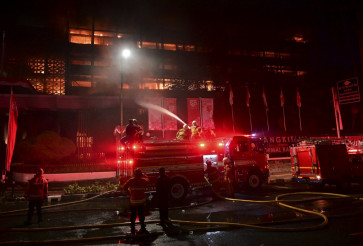Taring Padi: Amplifying voices through zine
True voice of the masses: Taring Padi’s zine Terompet Rakyat was created as a response to many issues surrounding the community, both local and international
Change text size
Gift Premium Articles
to Anyone

T
rue voice of the masses: Taring Padi’s zine Terompet Rakyat was created as a response to many issues surrounding the community, both local and international.
It only takes bold ideas and a photocopier for Yogyakarta-based art collective Taring Padi to highlight people’s critical thoughts and creative ideas through its zine.
When you’re a writer trying to express your ideas and opinions, chances are you’ll have to tone down your words or even abandon your ideas if you want to make it through mainstream publishers.
None of that is an issue if you decide to take the independent route. Zines, for example, can cover all sorts of topics and are usually distributed by underground groups that, for one reason or another, avoid the attention afforded to mainstream media.
One such group is Yogyakarta-based art collective Taring Padi. Founded in 1998 after the fall of Soeharto’s New Order regime, the group is primarily known for its politically loaded messages of social justice, expressed through posters made using its signature woodcut technique.
Alongside posters and banners, Taring Padi also communicates its ideas through a monthly zine titled Terompet Rakyat (People’s Trumpet). First published in 1999, the zine is a monthly staple of the group’s response to issues both local and international.
Taring Padi cofounder Hestu A. Nugroho said zines were common in Western countries, noting that they were generally created by those in the music scene or those who were labelled by society as “radical and provocative”.
“It means that these groups can be said to be ‘antimainstream’, in the sense that they are trying to counter the mainstream,” Hestu told The Jakarta Post on the last weekend of the Museum of Modern and Contemporary Art in Nusantara (Museum MACAN) exhibition “Dunia Dalam Berita”, which featured Taring Padi’s posters and banners.
“They utilize simple mediums and techniques, like photocopiers that are easy to use and distribute,” Hestu said, adding that period-appropriate techniques like collages were common back in the day.
In fact, Terompet Rakyat utilizes these very techniques. One member of the collective acts as the editor for an issue, creating the layout for the zine in a master copy. The master copy is then photocopied and the copies distributed to community channels such as warung (stalls).

“Taring Padi is interested in creating its zine as it is an affordable medium that can reach a wide audience. It can be said that it is a medium that allows people to come to a realization. When smartphones were not common, zines were very instrumental in getting our messages across.”
For each issue, Taring Padi accepts submissions by anyone interested in expressing their opinions — with forms ranging from handwritten essays and illustrations to collages, poetry and song lyrics.
The first issue of Terompet Rakyat was on antiviolence, responding to the rise of the movement of antimilitarism after the authoritarian New Order crumbled. Since then, the zine has also covered a wide-range of issues, such as environmental conflicts, violence against women, gender equality and antiwar sentiments.
When a major earthquake hit Yogyakarta in 2006, Taring Padi members put the zine on hiatus for a few years to direct their focus on community-oriented disaster relief efforts.
“During its heyday in the early 2000s, Terompet Rakyat always had a regular monthly release, give or take a week or two in lateness. The number of pages usually varied as well, depending on the contributors we got.
“However, maintaining that productiveness is quite hard. The zine as a medium is quite fluid, and that’s no reason to not publish an issue, but at the same time that’s also a reason for the delays,” Hestu explained, adding that he was pushing for another issue to be published in the near future.
In the lead up to the general election on April 17, Taring Padi displayed a series of round woodcut posters on Yogyakarta’s Kerkweg Bridge, urging passersby to vote wisely. Terompet Rakyat’s latest issue focused on election-related topics — from campaign promises to identity politics.
Taring Padi, as Hestu said, was not seeking a monetary profit from the zine but rather “profits” in the form of social change.
“It’s also a transfer of knowledge in a way. You can say that Taring Padi’s works are those that involve the transfer of knowledge. People tend to assume that our works have to have a physical form, but social change can be one of those as well.
“Taring Padi believes that artwork should come in two forms: one that we can create to the best of our abilities; the other in the form of sharing, like workshops and cooperation.”

— Photos by JP/Dhoni Setiawan









